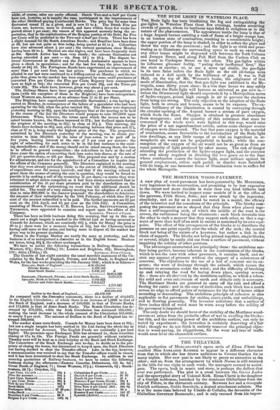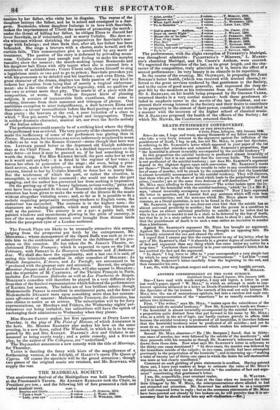THE THEATRES.
Tan production of MERCADANTE'S opera seria of Elena Uberti has enabled Miss ADELAIDE KEMBLE to appear in a different character from that in which she has drawn audiences to Covent Garden for so many nights. Her new part is not likely to prove so attractive as the other ; and so, from the arrangement by which Norma is still retained in the bills for one night in each week, the managers seemed to antici- pate. The opera, both in music and story, is perhaps the dullest that ever was performed.. The plot is a cross between the Gazza Ladra and the apocryphal story of Colonel Kirk. Elena Uberti is the daughter of a Guelph nobleman, banished by the dominant Ghibellines from the city of Feltre, in the thirteenth century. Between her and a renegade Guelph nobleman, Guido Sanvitale, a mutual attachment subsists. She is at the same time beloved by Ubaldo di Collalto, the favourite of the Ghibelline Governor Boemondo ; and is only rescued from his impor. tunities by her father, who visits her in disguise. The rescue of the daughter betrays the father, and he is seized and consigned to a dun- geon. Boemondo, whose daughter Imberga is in love with Sanvitale, makes the imprisonment of Uberti the means of promoting the match : under the threat of killing her father, he obliges Elena to discard her lover Sanvitale, as if voluntarily, and to marry Collalto. She does so : she witnesses without shrinking the preparatives for Sanvitale's mar- riage with Imberga ; and then finds that, after all, her father has been beheaded. She sings a bravura with a chorus, stabs herself, and the curtain falls. This commonplace plot is unrelieved by any merit of treatment. The passion of the story is deformed by pervading mean- ness. Collalto evinces just enough real feeling to make his marplot rascality show the meaner ; the match-making tyrant Boemondo and his daughter bait Elena with silly taunts when she is coerced into a semblance of unfaithfulness; Count Uberti only shows himself to sing a lugubrious strain or two and to go to prison ; Sanvitale provokes you with his proneness to be deluded and his inaction ; and even Elena, the great character of the drama, displays too little passion of any kind to redeem her position from being that of merely a tragical embarrass- ment: she is the victim of the author's ingenuity, with no qualities of her own to attract more than pity. The music is of a piece with the composition, or worse. Not without frequent hints of pleasing subjects, it consists of innumerable little exordiums, that come to nothing, tiresome from their sameness and triteness of phrase. One ambitious exception to utter insignificancy, a duet between Elena and Sanvitale—a lovers' reconciliation before the final parting—is not more than pretty : the bravura at the end, a poor imitation of a class to which " Non pia mesta " belongs, is vapid and inappropriate. There is neither dramatic character, musical art, nor even the fertile melody of the Italian school.
The performance could scarcely be of a striking kind where the thing to be performed was so trivial. The very poverty of the characters, indeed, made the inefficiency of some of the performers less glaring than in Norma. HARRISON, for instance,w as not so ludicrously misplaced in mean Collalto as he was in the Roman General—mean though that hero was TOO. LEFFLER passed better as the depressed old Guelph nobleman than as the Chief Priest. STRETION is a decided improvement on the male force—at least it may be guessed so, if he had something to do 'worth the doing. For Miss KEMBLE herself, the part suits her as well as it would suit anybody : it is fitted to 'the register of her voice ; it leaves her often in possession of the stage ; she even, being a prac- tised actress, made a few points,—as where she saw through the ma- nceuvre, hinted to her by Collalto himself, to force her to marry him. But the tenderness of which the part, or rather the situation, is susceptible, is not within her command : she could not make the part engaging, and the author has prevented her from making it impressive.
On the getting-up of this "heavy lightness, serious vanity," pains and cost have been expended fit for one of Rossna's richest operas. Much attention has been given to make the words of the libretto fit the music without altogether violating sense ; and, so far as it is possible to fit a melody requiring perpetually recurring trochees to English verse, the endeavour has succeeded. Pbe costume is in the highest taste : the characters are walking pictures, which may satisfy the historian as well as the painter. The scenery is on a par : a public hall, with painted windows and escutcheons glowing in the pride of ancestry, is one of the most magnificent scenes ever brought from distant lands before the pampered eyes of a London audience.



























 Previous page
Previous page